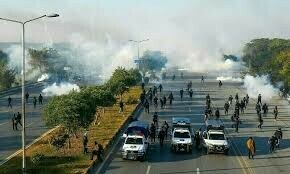
ISLAMABAD: In an unusual move, the chairman of the parliamentary committee concerned turned down the draft bill on stopping forced conversions by reading a printed message that the draft was against public interest.
Senator Liaquat Khan Taraki, chairman of the Parliamentary Committee to Protect Minorities from Forced Conversion, read out on Wednesday the message as soon as the members demanded a vote on the draft after a heated debate spanning more than two hours.
While Minister for Human Rights Dr Shireen Mazari, a member of the committee, waited, the meeting was delayed as the chairman of the panel was in a separate huddle with two other members of the committee — Minister for Religious Affairs Pir Noorul Haq Qadri and Minister of State for Parliamentary Affairs Ali Mohammad Khan — at Parliament House building.
The opening remarks of the committee meeting were made by Dr Ramesh Vankwani who said the panel had been holding meetings for more than 18 months, and about Rs2.5 million had been spent on each meeting.
Parliamentary committee’s meeting ends amid protest by non-Muslim members
“We have reached some settlement and the draft has been finalised. It should be put to voting in this meeting,” Dr Vankwani said adding “whatever amendments are required will be made as the proceeding moves on”.
Similar comments were made by Dr Mazari as she said the draft bill — titled “Prohibition of Forced Conversion Bill 2021” — was prepared by former chairman of the committee Senator Anwarul Haq Kakar, and the ministry of human rights had only vetted it and returned it to the panel.
“This is not a government bill sponsored by the Ministry of Human Rights, but this committee is the custodian of this draft,” she said. “But the treatment meted out by the Council of Islamic Ideology (CII) to the draft was not fair and as it invited Mian Mithu, the main accused of forced conversions in Sindh, for a briefing.”
Her statement was followed by remarks of Mr Qadri who said religious matters were the domain of the Ministry of Religious Affairs, “And we reject this draft bill as it has been turned down by the CII.
“This issue needs administrative measures and there is no need for fresh legislation to control forced conversions. This draft bill has divided the society and made the matter controversial, while there are strong reactions from Senator Mushtaq Ahmed, etc.”
Mr Khan too rejected the draft bill and even submitted a written statement on behalf of the Ministry of Parliamentary Affairs, claiming that the committee had no right to formulate any legislation, the draft bill was contrary to the principals of Sharia and against several articles of the Constitution. “This draft will only create unrest in society and those in favour of this draft are only seeking a pat on the back from NGOs and foreign countries,” Mr Khan said.
The meeting witnessed several rounds of exchange of arguments between the members and the ministers, among the members and even among the ministers at one point.
Senator Mushtaq Ahmed of Jamaat-i-Islami said there was neither persecution of non-Muslims in Pakistan nor any proven case of forced religious conversion as the country was safer for non-Muslims when compared to the treatment meted out to the Muslims in Canada, Norway, New Zealand, etc.
He referred to a study conducted by an Islamabad-based think tank IPS that all the 6,051 people who had converted to Islam between 2008 and 2020 had voluntarily made the decision.
Senator Maulvi Faiz Mohammad of the Jamiat Ulema-i-Islam-Fazl said the main flaws in the draft bill were setting of 18 years as minimum age for conversion, making the conversion statement in front of a magistrate mandatory and confining the person willing to convert to Islam to an unspecified location.
The two senators argued that anyone who was able-minded could embrace Islam and there was no need to make such acknowledgement in front of a magistrate.
However, the parliamentarians belonging to religious minorities said if forced conversion was an issue it had to be stopped and asked Mr Khan to suggest measures to halt it.
MNAs Lal Chand Malhi, Keshoo Mal, Jai Parkash and Naveed Amir Jeeva and Senator Danesh Kumar highlighted that all decisionmaking in the country was allowed at the age of 18 years, including the right to vote, obtaining driving licence or arms licence, so conversion too should be allowed at the age of 18 years.
“The All India Muslim League demanded in 1927 that age of conversion should be 18 years,” Dr Vankwani said.
Mr Parkash said the state had to take responsibility and should not delegate its authority to Mian Mithu, Pir Ayub Jan Sarhandi or anyone else as far as conversion was concerned.
Mr Taraki adjourned the meeting amid protest by the non-Muslim members of the committee.
Published in Dawn, October 14th, 2021















































